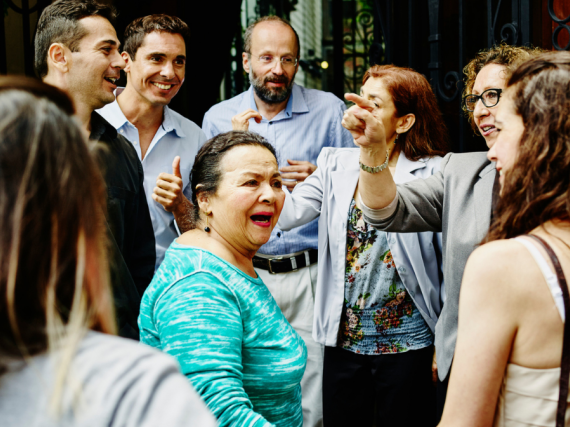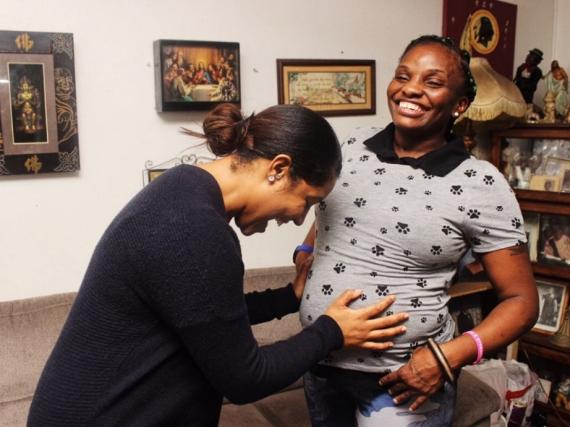Working with Marginalized Women in Franklin County, Ohio
Integrating family planning into substance abuse treatment is just one of the many best practices The Ohio Better Birth Outcomes (OBBO) collaborative is innovating to help reduce infant mortality in the Columbus, Ohio, and Franklin County region.
OBBO consists of the community’s four hospital systems, Nationwide Children’s Hospital, Mount Carmel Health*, OhioHealth, and The Ohio State University Wexner Medical Center, along with Columbus Public Health and PrimaryOne Health, the largest network of federally qualified health centers (FQHCs) in Columbus.
Columbus has one of the highest infant mortality rates of America’s 50 largest cities. An average of three babies die each week in Columbus before their first birthday. OBBO is a lead partner of CelebrateOne, the collective impact initiative housed in the City of Columbus Mayor’s Office to reduce the infant mortality rate by focusing on efforts to decrease prematurity, expanding access to prenatal care, and improving reproductive health planning access and education.
Along with the current infant mortality crisis, the region is also experiencing an opioid crisis. In 2017, Ohio ranked second in the U.S. for the highest number of drug overdose deaths. The Franklin County coroner reported that between 2012 and 2016, the county saw a 71% increase in overdose deaths.
A recent study in the Journal of Substance Abuse Treatment found that nine out of ten pregnancies among women addicted to opiates were unintended. Women who are dependent and pregnant often are faced with social determinants that can negatively affect the outcomes of the baby. Those social determinants, such as poor nutrition, poverty, lack of prenatal care, and untreated behavioral health concerns, can lead to prematurity and neonatal abstinence syndrome. One recent conversation with a drug treatment center in Columbus found that more than 78 percent of the women being treated for drug addiction also smoked cigarettes, which can be directly linked to infant mortality.
Additionally, the long-term neurodevelopmental consequences of prenatal opioid exposure is poorly understood. Children may experience life-long challenges with executive function and other developmental challenges.
It is in this landscape that OBBO has implemented several projects that integrate family planning into substance abuse treatment in Columbus.
A Title X extension clinic at CompDrug, a therapeutic treatment provider, offers daily medication assisted therapy (MAT) as well as a fully responsive range of research-based programs and services to assist in the prevention, treatment, recovery, and wellness of those affected by the disease of addiction. The clinic, open one morning a week, provides a wide range of free women’s health services, including same-day access to all methods of contraceptives. All services are provided on a walk-in basis, which is critical for a population facing multiple barriers to making and keeping appointments. The clinic is located in a separate building next door to the dosing center. By separating the clinic from the congested and busy dosing center, the clinic provides a calm and light atmosphere. Feedback from a focus group revealed that there is a perceived stigma that women carry with them, and they often face judgement from medical providers when they explain their addiction during medical appointments. This is not the case at the clinic. Overwhelmingly, the women were thrilled that the providers at the clinic understood they were recovering addicts, which eliminated the stigma and awkward conversations about their addiction. This has enabled some to access the reproductive healthcare they desire but have neglected in some cases for years. This is especially important for women who have already encountered additional trauma in the medical system. Since the initiative has started we have expanded into 9 locations across Franklin County and have provided 243 women’s health appointments and 43 LARC methods as well as all other methods of contraception.
OBBO is also piloting an initiative to incorporate reproductive health education and a mobile care unit into the Columbus CATCH Program. The CATCH program is a specialized docket of the Municipal Court that provides a non-adversarial approach to defendants who have pled guilty to loitering, solicitation, prostitution, and other crimes where the defendant has been the victim of human trafficking. The defendant agrees to two years of probation and to adhere to the treatment plan that was designed uniquely for the individual, including residential treatment, counseling, random drug screens, and a weekly CATCH status review hearing. Health educators attend court sessions to provide sexual and reproductive health education to the participants. Court staff and counselors have been trained to help make appointments during the monthly visit of a mobile medical unit. This model of client education, staff partnerships, and monthly mobile services is also being integrated into two residential treatment facilities for females in recovery services for addiction.
OBBO is also working to pair women’s health services with current inpatient and outpatient MAT treatment programs within several hospital systems and FQHCs across the city. OBBO is supporting the training of staff in the MAT programs to incorporate assessment of pregnancy intent into the clinical case plans, and then creating a direct link to internal women’s health services for patients. In some cases, registration staff will ask when a new patient’s last women’s health exam occurred. If more than a year ago and she desires an appointment, her first MAT visit will also be linked with a women’s health appointment on the same day that she attends a MAT appointment to reduce additional transportation barriers.
As Ohio continues to experience an infant mortality crisis as well as the ongoing opioid crisis, and more treatment centers look to holistically treat patients, OBBO will continue to analyze results of the pilot projects, work to improve processes and results, and adapt to meet the needs of women in treatment and the needs of the centers serving this population.
*Mount Carmel Health System does not promote, condone or endorse all the values expressed herein. While Mount Carmel is a member of OBBO no resources from Mount Carmel were used in the development or dissemination contraceptive services or education.



